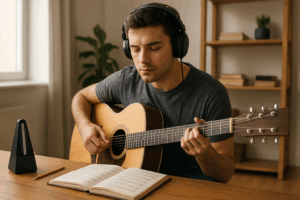Starting to learn music is exciting, but like with any new skill, the road can be filled with bumps — especially if you’re unaware of some common pitfalls. While making mistakes is part of the process (and even necessary for growth), certain habits can slow down your progress or make the learning journey frustrating.
Whether you’re learning on your own, with a teacher, or through online tutorials, being aware of the typical mistakes beginners make can save you a lot of time and keep your motivation high. In this article, we’ll break down seven common mistakes music learners often make — and most importantly, how you can avoid them.
1. Skipping the Basics and Jumping Ahead
One of the most tempting mistakes is trying to play advanced pieces too early or rushing through lessons to get to the “fun” stuff. This usually leads to gaps in understanding and sloppy technique.
Why This Happens:
- You’re eager to play your favorite songs.
- Beginner exercises feel boring or too slow.
- You assume you’ll “figure out” the hard parts later.
Why It’s a Problem:
Skipping fundamentals creates a shaky foundation. You might end up with bad habits that are hard to fix later, like poor finger placement, improper timing, or misunderstanding rhythm.
How to Avoid It:
- Respect the learning process. Basics like scales, posture, and rhythm training set you up for long-term success.
- Mix fun with fundamentals. Practice a simple version of your favorite song and your basic exercises.
- Trust your curriculum or teacher — those early lessons exist for a reason.
2. Practicing Without a Plan
Many beginners sit down to practice without any real structure — just noodling on their instrument, playing random pieces, or repeating what’s already comfortable.
Why This Happens:
- Lack of guidance or curriculum.
- Not knowing how to organize a practice session.
- Believing that “any practice is good practice.”
Why It’s a Problem:
Unfocused practice leads to slower progress. You might spend time reinforcing bad habits or avoiding the hard stuff altogether.
How to Avoid It:
- Set a clear goal for each session (e.g., “work on left-hand accuracy” or “learn 8 bars of this song”).
- Break practice time into segments: warm-up, technical work, song learning, cool-down.
- Keep a notebook or app to track what you practiced and what to improve.
3. Not Using a Metronome
Timing is one of the most overlooked aspects of music — especially for beginners. Playing “freely” without regard to rhythm can create a habit that’s hard to break later.
Why This Happens:
- Beginners often focus on notes, not rhythm.
- A metronome can feel intimidating or distracting.
- Some believe rhythm will come naturally over time.
Why It’s a Problem:
Poor timing makes it difficult to play with others, record, or progress to more complex music. Good rhythm is just as important as hitting the right notes.
How to Avoid It:
- Use a metronome during your practice sessions, even at slow tempos.
- Start slow, then gradually increase the tempo as you become more confident.
- Practice clapping or tapping rhythms before playing them.
4. Practicing Too Fast
It’s natural to want to play fast. But trying to speed through music before mastering it slowly almost always leads to errors and frustration.
Why This Happens:
- Impatience.
- You think playing fast = playing better.
- You want to match the speed of your favorite recordings.
Why It’s a Problem:
Speed without accuracy creates sloppy playing. You’ll reinforce mistakes, and your muscle memory will “learn” them incorrectly.
How to Avoid It:
- Always start slow and only speed up once you can play the piece cleanly.
- Use a metronome to gradually increase speed.
- Record yourself to monitor clarity and precision.
5. Avoiding Music Theory
Music theory sounds scary to some beginners, but it’s a powerful tool that helps you understand what you’re playing and why it sounds the way it does.
Why This Happens:
- Misconception that theory is boring or only for classical musicians.
- Belief that it’s not necessary for playing pop, rock, or by ear.
- Fear of complex terms and symbols.
Why It’s a Problem:
Lack of theory understanding limits your ability to improvise, compose, transcribe, or even memorize music efficiently.
How to Avoid It:
- Start with the basics: notes, scales, intervals, chords, key signatures.
- Use real-world examples to understand concepts (e.g., why a certain chord progression works in your favorite song).
- Integrate theory into your playing — apply what you learn immediately.
6. Being Too Hard on Yourself
Many beginners expect perfection too early. When progress feels slow or mistakes pile up, it’s easy to get discouraged and feel like you’re not “talented enough.”
Why This Happens:
- Unrealistic expectations.
- Comparing yourself to more experienced musicians.
- Frustration from not seeing immediate results.
Why It’s a Problem:
Self-doubt can kill motivation. It can lead to giving up prematurely or developing anxiety around practice and performance.
How to Avoid It:
- Celebrate small wins: cleanly playing one section of a piece is progress!
- Track your improvements over time — even weekly recordings help.
- Remind yourself: every great musician was once a beginner. Progress takes time.
7. Learning Alone Without Feedback
Learning music solo — especially online — is more accessible than ever, but it comes with a downside: lack of feedback. Without someone to correct you, you might not notice your own mistakes.
Why This Happens:
- YouTube lessons or apps feel sufficient.
- In-person lessons can be costly or unavailable.
- You feel confident in self-teaching.
Why It’s a Problem:
Even the most motivated learners can develop bad habits without realizing it. Small technique issues can turn into bigger problems down the road.
How to Avoid It:
- Consider occasional lessons with a teacher, even virtually.
- Ask for feedback from other musicians in forums or communities.
- Record yourself and analyze your posture, technique, and sound.
Progress Comes from Awareness — Not Perfection
Everyone makes mistakes when learning music — and that’s okay! The key is not to fear mistakes, but to learn from them and avoid repeating the ones that truly slow you down.
By building good habits early, staying patient, and being intentional with your learning, you’ll enjoy the journey and progress more consistently. Whether you’re learning piano, guitar, drums, or voice — your growth depends on the choices you make day by day.
So don’t worry about being perfect. Focus on being consistent, curious, and open to learning. That’s what makes a great musician.




